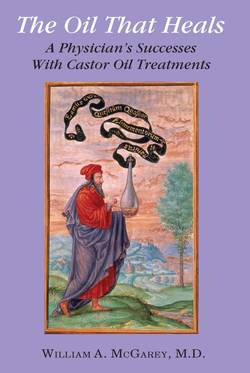Читать книгу The Oil That Heals - William A. McGarey M.D. - Страница 11
На сайте Литреса книга снята с продажи.
Chapter Two Medical School and Early Practice Years
ОглавлениеExperts abound in all medical schools, and my classmates saw them as the fountainhead of all knowledge—gurus, in a sense. Much knowledge, but little philosophy. Philosophers are rare indeed in medical halls of learning. They are present, but their voices are outnumbered, unheard, or discounted. Existence of a Higher Power, a Creative Energy, a God, was not acknowledged in my four years of medical schooling. Except, perhaps, in the form of profanity.
I recall clearly a particularly wild argument I had with John Miley, one of my classmates. He was saying, “That’s what the experts say in the textbooks.” I was telling him why their statements did not make sense to me, and questioning why I should accept their point of view. Common sense—philosophy—does not often find its way into medical literature.
Early in my practice of medicine, a pathologist was looking at a section of the appendix which had been removed. He told me it showed appendicitis. I looked at the specimen and asked the doctor how many lymphocytes had to be there to designate it as appendicitis instead of a normal appendix. He shrugged off the question, but I persisted because normally the appendix does have lymphocytes present when nothing is wrong. Such a presence is, in fact, a part of the immune system, which encompasses all the lymphatic tissue in the body. It appeared to me that the number of lymphocytes present simply gave the pathologist an opportunity to make an educated guess. His guess was “appendicitis.” My pathologist was unhappy with me, but he didn’t know that I used to smell dandelions.
I found out from these two experiences that all things are not really as they seem. The experts are not always right, as we often assume, and disease is not an on/off phenomenon, but rather a process found active within the physiology of the human body.
Medical school did teach me, however, about the structure of the body, about physiology, something about the various specialties, a great deal about pharmacology, much about pathology—the end point of a disease process—but most significantly we were taught about diseases, how to recognize them when they appear (sometimes as if by magic), and how to do battle with them. We were not taught that the body frequently has amazing abilities to overcome the beginning stages of a disease process, if given a bit of help here and there. And we were not given any instruction about nutrition, dietary practices, or the effect of these upon the health of the body. Nor were emotions and their direct effect upon the functioning of the body given credence.
I was impressed by the work which Richard Vilter, one of my professors, had done in the field of vitamins, and I could not understand why the use of vitamins as an aid to the body was not more widespread. I tested vitamins early in my medical school career, and I found that I had more energy and simply felt better when I used them. Another insight—something good might be happening within the body tissues when you simply feel better. But arguments still rage about what vitamins do and do not accomplish.
A good night’s sleep will often make one feel better. Seeing someone you love will do the same. A good hug—or a bunch of hugs—will enhance that same feeling. Recent work has shown that one feels worse when one frowns, feels better if one puts a smile on one’s face—no matter how “down” the person may feel prior to the smile. And, if things get worse, laugh! That’s another way to move toward happier, feeling-better times. To a degree, those happier times spell healing of the body.
It was shortly after I began my practice of medicine in my home town of Wellsville, Ohio, that I discovered another way to gain an insight into myself—another way to smell the dandelions. It was a very busy time, and house calls were still a way of life in that mid-Western town.
After an especially busy day including house calls, surgery in the morning, and a full day at the office, I finally climbed into bed. When the phone rang shortly after midnight, I groaned. I was summoned on another call, and I grumbled all the way to my car, vowing to charge five dollars instead of the usual three.
When I returned home, more like a pussy cat than the roaring lion, I tried to sneak into bed without waking my wife. But she heard me and said, “Well, did you charge them like you said you would?” I told her I didn’t—that the little girl was really sick, and besides, they didn’t have any money to pay me for the visit. We went to sleep again.
It was at that point that I became aware that service was what I was there for and I chose it. My later years emphasized that concept of service and enlarged on it, for how is the quality of Divine Love best manifested, unless it is in helping those who need help, caring for those who are anxious and insecure, those who are sick in body, mind, or spirit?
